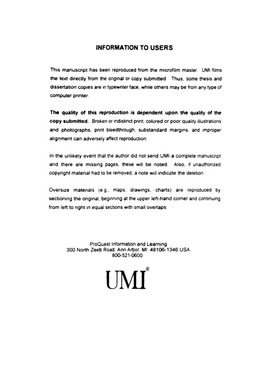| dc.contributor.advisor | Copeland, Gary, | en_US |
| dc.contributor.author | Jones, Jocelyn Michele. | en_US |
| dc.date.accessioned | 2013-08-16T12:18:49Z | |
| dc.date.available | 2013-08-16T12:18:49Z | |
| dc.date.issued | 2002 | en_US |
| dc.identifier.uri | https://hdl.handle.net/11244/538 | |
| dc.description.abstract | The present work utilizes multiple data sources and methodological approaches to offer a more thorough analysis of the nuances of women's legislative behavior. In the first section, interview data is combined with Member- and district-level data to examine the partisan contours of electoral politics. To examine how the constituent factors translate into legislative behavior, the second section develops a predictive model of ideological voting behavior within the context of partisanship. While taking into account theoretically significant Member- and district-level characteristics, this section examines the cross-pressures presented by partisanship, sex, and electoral security. The next section takes a more qualitative approach to understand the effects of these cross-pressures on Member behavior within the party organization. This analysis addresses informal party organizational behavior by examining national media communications, fundraising activities, organizational records, and interview data. By combining qualitative and quantitative methodological approaches, this study more fully captures the ideological and partisan dynamic of the legislative behavior of female Members of Congress. | en_US |
| dc.description.abstract | While the literature suggests stark differences between the sexes in terms of legislators' issue voting, committee behavior, and leadership styles, it offers little insight on possible ideological and behavioral differences among women in the Congress. Through an analysis of the ideological, partisan, and legislative behavior of women, this study provides a more thorough understanding of women's participation in the legislative arena. One of the nuances of the present analysis is its attention to the informal structures of Congress. Little work has been done to assess the partisan dynamic of electoral politics. Likewise, little has been done to capture female Members' involvement with and attitudes toward the party in terms of organizational and issue support. Consequently, this analysis provides, a look at the informal contexts within which women participate as ideological and partisan actors. | en_US |
| dc.description.abstract | This study suggests that women operate in a complex environment structured by partisanship. Their behavior is influenced by various cross-pressures, including party culture and electoral security. While Democratic women enjoy a party culture that facilitates constituency responsiveness and ideological diversity, Republican women operate within a culture that encourages party loyalty and ideological homogeneity. In the end, Republican women must make critical choices that influence their effectiveness within the party organization and thereby in the Congress. As long as the Republican Party holds the majority, this finding has significant implications for the effectiveness of women within the institution and the representation of women at large. This work also suggests that party culture structures Member behavior, and thus has implications both theoretically and methodologically for the future study of congressional behavior. Finally, this study encourages the pursuit of integrated theoretical frameworks and mixed methodologies in order to better understand the complex workings of the political environment in which women participate. | en_US |
| dc.format.extent | xiii, 245 leaves : | en_US |
| dc.subject | Political Science, General. | en_US |
| dc.subject | Women's Studies. | en_US |
| dc.subject | Women legislators United States. | en_US |
| dc.title | It's my party...: Examining women as partisans within the United States Congress. | en_US |
| dc.type | Thesis | en_US |
| dc.thesis.degree | Ph.D. | en_US |
| dc.thesis.degreeDiscipline | Department of Political Science | en_US |
| dc.note | Source: Dissertation Abstracts International, Volume: 63-11, Section: A, page: 4072. | en_US |
| dc.note | Adviser: Gary Copeland. | en_US |
| ou.identifier | (UMI)AAI3070643 | en_US |
| ou.group | College of Arts and Sciences::Department of Political Science | |
